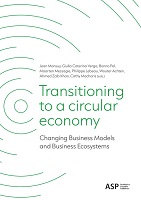Transitioning to a circular economy
Changing Business Models and Business Ecosystems
| dc.contributor.editor | Mansuy, Jean | |
| dc.contributor.editor | Verga, Giulia Caterina | |
| dc.contributor.editor | Pel, Bonno | |
| dc.contributor.editor | Messagie, Maarten | |
| dc.contributor.editor | Lebeau, Philippe | |
| dc.contributor.editor | Achten, Wouter | |
| dc.contributor.editor | Khan, Ahmed Zaib | |
| dc.contributor.editor | Macharis, Cathy | |
| dc.date.accessioned | 2022-11-29T10:54:19Z | |
| dc.date.available | 2022-11-29T10:54:19Z | |
| dc.date.issued | 2022 | |
| dc.identifier.uri | https://library.oapen.org/handle/20.500.12657/59775 | |
| dc.description.abstract | We are living on a finite planet. Humankind is overstepping planetary boundaries, however. In 2021, worldwide consumption has exceeded the yearly bio-capacity of the Earth (what we call the overshoot day) on the 29th of July. For industrialised countries, the situation is far worse: In 2022, Belgium reached that overshoot day on the 26th of March. In the face of these urgent challenges of sustainable resource use, there is wide agreement on the need for a transition, a fundamental societal shift, towards, amongst others, a circular economy (CE), the focus of this book. The book speaks deliberately of transitioning. This marks our focus on transition processes and activities. Discussions of ‘the transition’ easily get stuck in abstract visions, remote future goals and ideological statements about the desired world of tomorrow. By contrast, much more attention needs to be paid to concrete transformation processes that could lead towards these projected futures. Transition how? Where to? By whom? We highlight that companies are key actors in CE transitioning. This edited volume presents key outcomes from the “Transitioning Belgian companies into circularity” research chair, established by Belgian Employers’ Federation FEB/VBO. Whilst focusing on the role of companies, we show how the private sector cannot bring about such societal transformations single-handedly. We consider companies as embedded transition agents, i.e. as actors that operate as parts of broader business ecosystems. The book results from collaborative work between researchers from the Vrije Universiteit Brussel (VUB) and the Université Libre de Bruxelles (ULB). Containing contributions by Jean Mansuy, Giulia C. Verga, Bonno Pel, Maarten Messagie, Philippe Lebeau, Wouter Achten, Ahmed Z. Khan, Cathy Macharis, Ela Callorda Fossati and Tom Bauler, it gathers expertise in sustainable urbanism, transition governance, the redesign of systems, lifecycle analysis, and business model innovation. | en_US |
| dc.language | English | en_US |
| dc.subject.classification | thema EDItEUR::K Economics, Finance, Business and Management::KJ Business and Management::KJG Business ethics and social responsibility | en_US |
| dc.subject.classification | thema EDItEUR::K Economics, Finance, Business and Management::KJ Business and Management::KJJ Business and the environment; ‘green’ approaches to business | en_US |
| dc.subject.classification | thema EDItEUR::R Earth Sciences, Geography, Environment, Planning::RN The environment::RNP Pollution and threats to the environment::RNPG Climate change | en_US |
| dc.subject.other | Circular economy; business; economy;business models; business ecosystems;circular; transitioning;climate;industry;society | en_US |
| dc.title | Transitioning to a circular economy | en_US |
| dc.title.alternative | Changing Business Models and Business Ecosystems | en_US |
| dc.type | book | |
| oapen.identifier.doi | 10.46944/9789461173942 | en_US |
| oapen.relation.isPublishedBy | 5cae5a70-e73a-4f54-96c8-533084e04e50 | en_US |
| oapen.relation.isbn | 9789461173935 | en_US |
| oapen.relation.isbn | 9789461173959 | en_US |
| oapen.pages | 220 | en_US |
| oapen.place.publication | Brussel | en_US |

